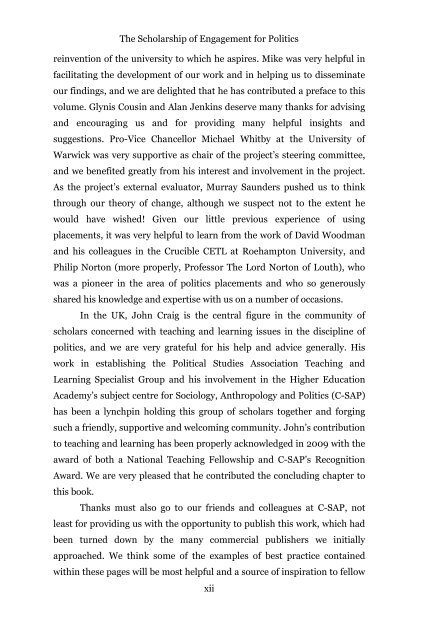The Scholarship of Engagement for Politics: - Higher Education ...
The Scholarship of Engagement for Politics: - Higher Education ...
The Scholarship of Engagement for Politics: - Higher Education ...
Create successful ePaper yourself
Turn your PDF publications into a flip-book with our unique Google optimized e-Paper software.
<strong>The</strong> <strong>Scholarship</strong> <strong>of</strong> <strong>Engagement</strong> <strong>for</strong> <strong>Politics</strong><br />
reinvention <strong>of</strong> the university to which he aspires. Mike was very helpful in<br />
facilitating the development <strong>of</strong> our work and in helping us to disseminate<br />
our findings, and we are delighted that he has contributed a preface to this<br />
volume. Glynis Cousin and Alan Jenkins deserve many thanks <strong>for</strong> advising<br />
and encouraging us and <strong>for</strong> providing many helpful insights and<br />
suggestions. Pro-Vice Chancellor Michael Whitby at the University <strong>of</strong><br />
Warwick was very supportive as chair <strong>of</strong> the project’s steering committee,<br />
and we benefited greatly from his interest and involvement in the project.<br />
As the project’s external evaluator, Murray Saunders pushed us to think<br />
through our theory <strong>of</strong> change, although we suspect not to the extent he<br />
would have wished! Given our little previous experience <strong>of</strong> using<br />
placements, it was very helpful to learn from the work <strong>of</strong> David Woodman<br />
and his colleagues in the Crucible CETL at Roehampton University, and<br />
Philip Norton (more properly, Pr<strong>of</strong>essor <strong>The</strong> Lord Norton <strong>of</strong> Louth), who<br />
was a pioneer in the area <strong>of</strong> politics placements and who so generously<br />
shared his knowledge and expertise with us on a number <strong>of</strong> occasions.<br />
In the UK, John Craig is the central figure in the community <strong>of</strong><br />
scholars concerned with teaching and learning issues in the discipline <strong>of</strong><br />
politics, and we are very grateful <strong>for</strong> his help and advice generally. His<br />
work in establishing the Political Studies Association Teaching and<br />
Learning Specialist Group and his involvement in the <strong>Higher</strong> <strong>Education</strong><br />
Academy’s subject centre <strong>for</strong> Sociology, Anthropology and <strong>Politics</strong> (C-SAP)<br />
has been a lynchpin holding this group <strong>of</strong> scholars together and <strong>for</strong>ging<br />
such a friendly, supportive and welcoming community. John’s contribution<br />
to teaching and learning has been properly acknowledged in 2009 with the<br />
award <strong>of</strong> both a National Teaching Fellowship and C-SAP’s Recognition<br />
Award. We are very pleased that he contributed the concluding chapter to<br />
this book.<br />
Thanks must also go to our friends and colleagues at C-SAP, not<br />
least <strong>for</strong> providing us with the opportunity to publish this work, which had<br />
been turned down by the many commercial publishers we initially<br />
approached. We think some <strong>of</strong> the examples <strong>of</strong> best practice contained<br />
within these pages will be most helpful and a source <strong>of</strong> inspiration to fellow<br />
xii
















